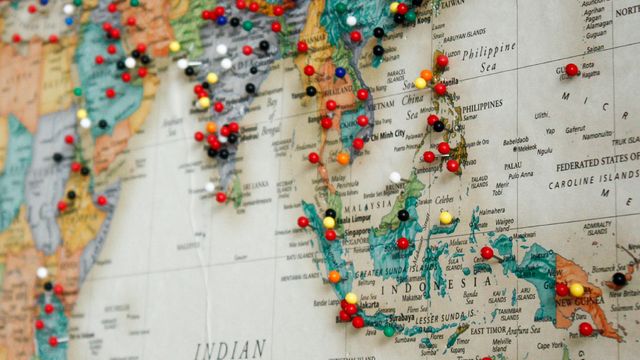Following US President Donald Trump’s sweeping imposition of tariffs on exports from Mainland China in 2018 followed by pandemic lockdowns and travel restrictions, supply chains across the world sunk into crisis in 2020.
Freighters idled outside leading ports, such as Los Angeles, as terrestrial transport systems could not take their cargo.
Supply chain disruptions caused shortages of basic items, such as food and fuel, even in advanced countries.
West Texas Intermediate crude oil futures, the benchmark for trade across much of the world, slumped to below negative US$30 per barrel in early 2020, as storage depots ran out of tank space, demand evaporated, and freight networks became tangled.
The United Nations Conference on Trade and Development (UNCTAD) reported that the cost of shipping a 40-foot container from Shanghai to New York jumped fivefold from US$2,325 in September 2019 to US$11,778 in September 2021.
Discussion on a realignment, rework or reset of supply chain systems to make them more resilient to crises began as soon as the pandemic struck.
One change has been that the logistics industry has been paying attention to value added across the chain.
The global value chain (GVC) differs from traditional supply chains in that value is added at each step, and information travelling up the chain is as important as the items travelling down it.
Many industry leaders now acknowledge the importance of having multiple supply sources across various regions and capacity to quickly turn to other suppliers, should their primary source not be able to deliver.
The current diversification of supply networks reverses the trend over preceding decades, when cost-cutting pressures, removal of trade barriers and a desire for economies of scale led to many goods and resources having a very narrow set of suppliers and transport routes.
Another issue weighing on the logistics world is greening of transport. Shipping, aviation and land transport account for a growing share of carbon dioxide output. Logistics-linked emissions are rising sharply following the COVID-induced pause, putting the issue under the spotlight.
As one of the world’s leading logistics hubs, Hong Kong is seeking to cut transport emissions. In his Policy Address last month, Hong Kong SAR Chief Executive John Lee announced a study on replacing ships’ traditional bunker oil with methanol fuel, which can be derived from waste biomass. The Government will also promote the supply of sustainable aviation fuel.
For transport within the city, the Government will formulate a city-wide green transformation roadmap aiming to achieving zero vehicular emissions by 2050 as well as support the introduction of 700 electric buses and 3,000 electric taxis by 2027.
The Government will also draw up a comprehensive hydrogen strategy, with the aim to put together legislation on hydrogen production, transport and storage by 2025.
Supply chain resilience and green transport are key topics at this year’s Asian Logistics, Maritime and Aviation Conference (ALMAC) on 21 and 22 November, organised by the Hong Kong SAR Government and the Hong Kong Trade Development Council (HKTDC).
Themed “Future Proofing Supply Chains: Diversification, Decarbonisation and Digitalisation”, ALMAC will include several sessions on supply chain transformation and offers logistics professionals an opportunity to discuss the rapidly changing field at the annual industry event.
ALMAC will also weigh on environmental, social, and corporate governance (ESG) issues in logistics, exploring challenges and opportunities in reducing supply chain carbon emissions and promoting a circular economy.
Authorities in logistics will also discuss revolutionary solutions, cutting-edge technologies and the wide application of generative AI that propel the development of smart supply chains and shed light on the transformative impact of emerging technologies on supply chain management.







